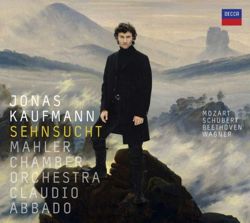|
|
|
|
|
|
|
|
| The Times, 18 September 2009 |
| Geoff Brown |
|
|
|
Jonas Kaufmann: Opera Recital |
| A showcase of the German
tenor’s beauty, power and flexibility |
|
 In
Germany, this recital has been released with the apt title Sehnsucht
(longing). Here it has no title at all, though music lovers should long for
it just the same. For it showcases the beauty, power and flexibility of the
young German tenor of the moment, Jonas Kaufmann. Go to Covent Garden this
week and you’ll find him soaring in Verdi’s Don Carlo. Buy this, his second
recital for Decca, and he’s nestling into his heartland, German-language
opera, though any tenor who mixes singing Lohengrin and Parsifal with
Tamino’s arias from Die Zauberflöte believes in variety. In
Germany, this recital has been released with the apt title Sehnsucht
(longing). Here it has no title at all, though music lovers should long for
it just the same. For it showcases the beauty, power and flexibility of the
young German tenor of the moment, Jonas Kaufmann. Go to Covent Garden this
week and you’ll find him soaring in Verdi’s Don Carlo. Buy this, his second
recital for Decca, and he’s nestling into his heartland, German-language
opera, though any tenor who mixes singing Lohengrin and Parsifal with
Tamino’s arias from Die Zauberflöte believes in variety.
The steadiness of pitch; the range of colours; the baritone depths; the
subtle phrasing and characterisations; the dynamic variety; the delicate
line of his Mozart; the ardour in Florestan’s Gott! Welch dunkel hier from
Fidelio; his clarion call in Wagner, lubricated and lightened with
Italianate sunshine: these perhaps are the main reasons for curling in front
of the hi-fi in wonder. Only a twinkle of humour seems missing; not the
case, say, with a past tenor like Fritz Wunderlich, whom Kaufmann points to
as a model. But Parsifal is no comedian, and in an age when CD companies and
promoters so easily lead handsome singers astray, Kaufmann’s seriousness of
purpose is very refreshing. I hope it lasts.
The images in the CD packaging — Photoshop riffs on Caspar David Friedrich’s
painting The Wanderer and other German Romantic icons — could be labelled
pretentious. But they neatly tell us about shared sensibilities and German
tradition. Even the track order is sensible, with Wagner’s enraptured
visions of the Holy Grail from Lohengrin and Parsifal leading us in and out,
and two curiosities from Schubert’s forgotten operas at the centre (the
symphony’s scherzo, if you like).
Whatever he sings, too, is cradled by the equally refined musicianship of
Claudio Abbado and the Mahler Chamber Orchestra. They’re as much of a
chameleon as Kaufmann, pumping up lushly when Wagner calls, slimming back
the vibrato for Mozart and gliding with lyrical rapture in the track from
Schubert’s Alfonso und Estrella, an aria of simple charms. But however well
judged and glowing Abbado’s orchestra is, there’s no question over where the
true glory lies. It’s in Kaufmann’s larynx, heart and head. |
|
|
|
|
|
|
|
|
|
|
|
|
|
|
|
|
|
|